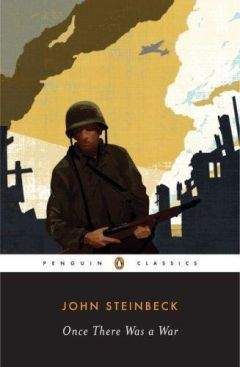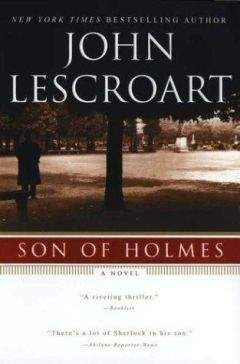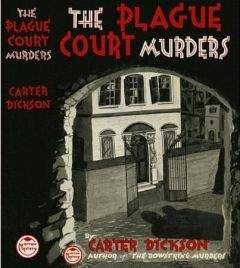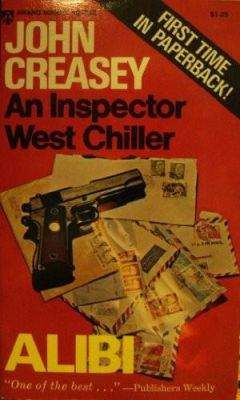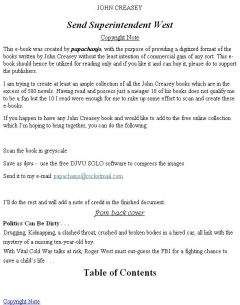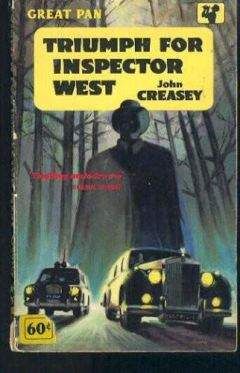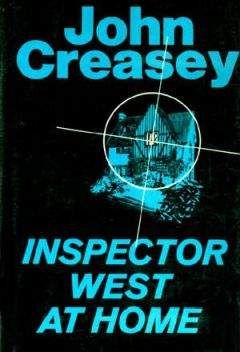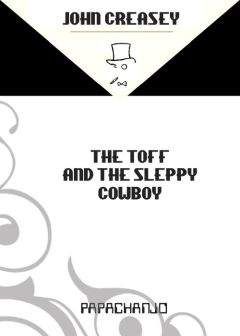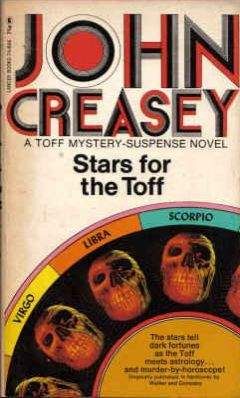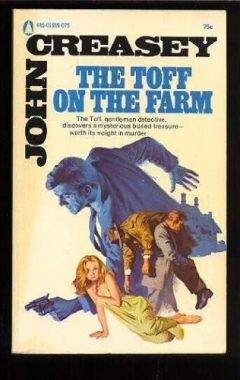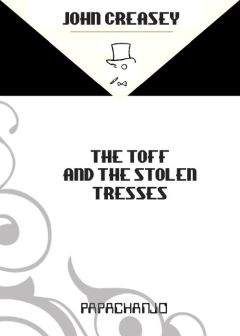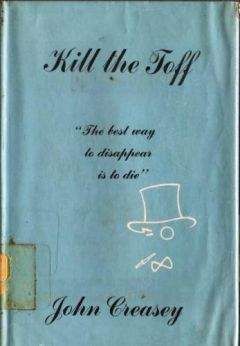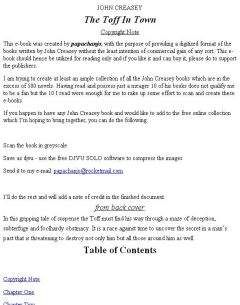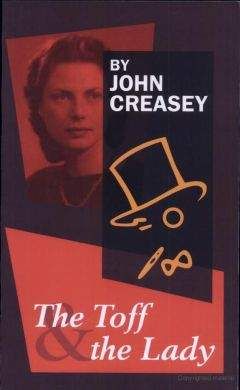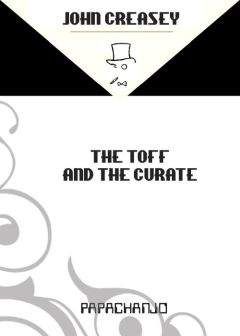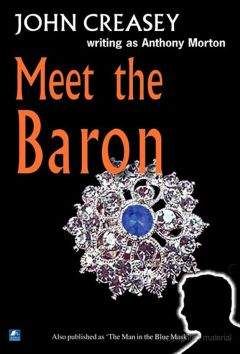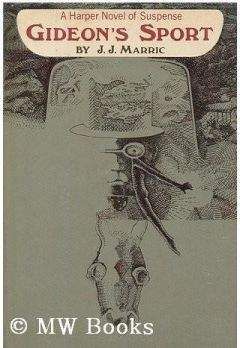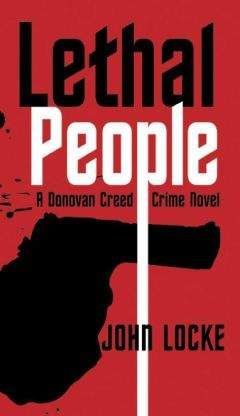John Creasey - Inspector West Alone
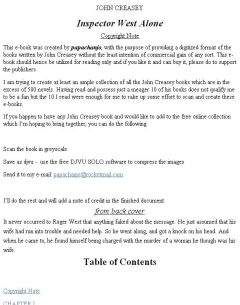
Скачивание начинается... Если скачивание не началось автоматически, пожалуйста нажмите на эту ссылку.
Жалоба
Напишите нам, и мы в срочном порядке примем меры.
Описание книги "Inspector West Alone"
Описание и краткое содержание "Inspector West Alone" читать бесплатно онлайн.
“Mr. Sloan?”
“Yes.”
“I’m warning you, Mr. Sloan. They’re after you.”
“Who——”
“Use your wits. There’ll be an attack. Maybe a rundown. It’ll come quick. I’m warning you, Mr. Sloan.”
“Listen! Who——”
“I’ve warned you, just look out. And there’s another thing, Mr. Sloan.”
“Well?” Sloan had stopped expecting to be told the name of his caller.
“Remember the Copse Cottage job. Girl you never traced. Have a try in Paris. 23 Rue de Croix, District 8. Got that?”
“23 Rue de Croix, 8. Yes. Will you——”
“It’s the same job, and they mean to get you.”
Roger rang off and slipped out of the box. That was as far as he dared go; farther than was safe. He walked to the Strand and beckoned a taxi from the rank near the Savoy.
“Do you know Ealing?”
“Palm of me ‘and, brother!”
“Try and find Merrivale Avenue, will you?”
“Orf the Common, ‘seasy. There an’ back?”
“With a wait in between.”
“It’ll cost yer the world.” The cabby laughed his joke off. Roger sat back, legs crossed, watching the passing lights, letting his thoughts roam. A great deal depended on whether he got back without being missed. He smoked two cigarettes, and was half-way through a third when the cabby slowed down near Ealing Common Station.
“What number, Merrivale?”
“Thirty-five.”
“Okay.”
Number 35 Merrivale Avenue was a small house, standing in a tiny patch of garden, which even under the light of the stars, looked neat and tidy. No lights were on; it was now nearly half-past eleven, and there were few lighted windows in the long street. Roger rang the bell, and waited; rang again and knocked immediately afterwards.
A light went on, footsteps sounded on the stairs.
The man coming was Pep Morgan, who knew Roger West well; once, had known him very well indeed. He ran a private inquiry agency, and seldom risked a clash with the police. He opened the door, a ball of a man wrapped in a thick dressing-gown. His sparse hair was awry, and his nose and mouth were screwed up in annoyance. He squeaked:
“What the hell do you want?”
“Your services,” said Roger. “Fifty pounds for a job that’s not worth ten.”
“Who are you?”
“I’ll tell you when we’re inside, maybe,” said Roger. He squeezed past the round ball as a woman called out from upstairs: “Pep. Who is it. Pep?”
“Just a client, m’dear, just a client.” Pep closed the door and put on the light of a front room. He had bright-brown eyes, from which all traces of sleepiness had vanished. He eyed Roger closely. “I don’t know you,” he said.
“I hope you never will.” Roger took the fifty pounds from his pocket and put it on top of a small upright piano. Pep hardly glanced towards it. “This is a simple job, there’s no risk, and there’s nothing illegal, but it’s urgent. First thing in the morning—if you can’t do it earlier!—I want you to arrange for a man on a bicycle to start from the Burlington Arcade, take the first right and then the second left—got it?”
“I’ll write it down.” There was a pad and pencil near the telephone. Pep’s stubby fingers moved swiftly. “Yes?”
“And around there he’ll find traces of flour, which was dropped from a passing car. There are more traces, in different streets, usually at corners—always at corners, except one place. That’s a few doors from a house numbered twenty-seven. The number of the house is painted in black on a cream, fluted column.”
Pep wrote swiftly. “Yes?”
“I want to know the name of the street and the name of the owner of the house—just that and no more. As soon as you’ve got it, leave word at your office. A Mr. Brown will call you, probably about lunch-time—all he wants is that name and full address. All clear?”
“What’s worth fifty quid?”
“Being hauled out of bed.”
Pep rubbed his button of a nose. “Okay,” he said.
* * * *
Roger went back the way he had come—through the window of the downstairs office, so that he could latch the window and lessen the risk that signs of intrusion would be noticed. He locked the passage door with the skeleton key and went quietly upstairs.
The piece of gummed paper at the foot of his door was still in one piece; so Harry hadn’t realized that he had been out. He ripped it off, went in, closed the door gently, and then sat down in an easy-chair. He felt more light-hearted than he had for weeks.
Sloan could look after himself now.
Couldn’t he?
CHAPTER XVIII
SLOAN
BILL SLOAN tapped his silver pencil against his strong white teeth as he skimmed through the notes he had made on what he called The West Disappearance. These notes were kept jealously for his eyes alone. They contained a precis of everything he had done in the past two months in his quest for Roger. They showed that he had spent every spare minute of his time on the hunt. They also showed that he had worked with Mark Lessing, but not consulted any official at the Yard. He had taken the extreme precaution of buying a diary with a lock on it. There were references to Kennedy—a name only—Kyle, Marion Day, and several others; nothing was evidence in a legal sense.
He locked the book, put it away, and pressed a bell on his desk. He shared the big office with five other D.I.’s, but none of them was in. None had seen the book.
A middle-aged man with florid face, straggly grey moustache, barrel-shaped figure, and sullen, disappointed eyes came in. He let the door slam behind him.
“Want me?” he asked gruffly as he approached the desk. He was slovenly dressed. His brown suit needed not only pressing but also cleaning. His hair needed cutting. He looked as if he thought the world was against him, and had an almost furtive expression in his cloudy blue eyes.
Sloan said : “Yes, Banister. Do you know if the Assistant Commissioner is in?”
“Yes, I know the old—yes, he’s in.” Banister bit on his comment, and evaded Sloan’s eyes.
“Been after you again?” asked Sloan.
“He’s always after me. Everyone’s—oh, forget it.”
“All right, that’s all,” said Sloan. He watched the sergeant go out; the door slammed again, indicating that Banister was in a foul temper. Sloan leaned back in his chair for a few minutes, forgetting the A.C. He was recalling a conversation he’d had with Roger at Roger’s Bell Street house, a week or two before the disappearance. Roger had started it.
“Happy about Banister, Bill?”
“Can anyone be ? The scales are pretty heavily weighted against him.”
“I didn’t mean that.”
“What did you mean?” Sloan knew, but wanted it put into words.
“Would you trust him with much?”
“Well—I’ve no reason not to, but if I wanted anything kept right under my hat, I wouldn’t choose him to hold my hat for me.”
“That’s what I mean,” Roger had said.
The Yard was full of Roger; his face, his brisk walk, his crisp confidence, his unorthodoxy, his daring, his friendliness. Sloan owed his quick promotion to Roger; he felt lost and out on a limb ever since Roger had gone. The odd hint here, a suggestion there, a chat over a difficult case— Sloan had trained himself largely on Roger West. Admiration and respect had grown into confidence and friendship. He was probably the last man at the Yard who still believed that Roger was alive; and who believed the sun more likely to fail to rise than Roger to become corrupt.
He jumped up and hurried along to the Assistant Commissioner’s office. Had he telephoned for permission it would probably never have been granted. Chatworth seldom had time for D.I.’s except on a specific case.
Chatworth growled:
“Come in.”
“Morning, sir!” Sloan was bright and brisk.
“What do you want?” Chatworth glowered; so it was a bad moment to have chosen.
He was a big, burly man with grizzled grey hair and a shiny bald patch, a brown, tough, weather-beaten face, which in moments of affability became almost cherubic; then one could see the essential simplicity of the man. He was dressed in green homespun tweeds, and his blue collar was two sizes too large for him, his pink tie badly knotted. He looked like a farmer in a beauty salon; for the office was all chromium, glass, and tubular steel, spick and span—cold, unfriendly. No one quite knew how Chat-worth had managed to get the Office of Works to make him such an office.
“Can you spare me a few minutes, sir?”
“What about?”
“A personal matter, sir.”
“Come and sit down.” Chatworth pointed to a chair. Sloan sat in it stiffly, feeling on edge, knowing that Roger, in his place, would relax and light a cigarette and not care a hoot what the A.C. thought.
Chatworth pushed the papers away, made notes with a slim gold pencil, and looked up. The cherub in him appeared. He smiled, showing small teeth, and moved a silver cigarette-box across the black glass of his desk.
“Have a cigarette, Sloan. What’s it all about?”
“I’m scared, sir.” That was the kind of introduction Roger would have advocated as being sure to grip the A.C.’s attention. Chatworth raised a bushy eyebrow.
“Oh? What about?”
“I’ve had a warning which I think I ought to take seriously—that there is likely to be an attack on my life in the next day or two.”
“Whose corns have you been treading on?”
“It’s a long story, sir, and——”
Chatworth’s eyes sparkled, and were frosty.
“Anything,to do with West?”
Roger would have expected that. Sloan hadn’t. He gulped, smoke got mixed up with his larynx and he coughed and spluttered. Chatworth tapped the gold pencil on the glass top.
“Well, is it?”
“In a way, yes. I——”
“Been devoting a lot of time to West, haven’t you?”
“Not official time, sir, it wasn’t my job, but——”
“Spare time? A good detective shouldn’t have any spare time. He should either be working or relaxing in order to equip himself for the next real job that comes along. You don’t think West is dead, do you?”
“No.”
“You don’t think he’s turned bad, do you? Or this nonsense about a split mind.”
Nonsense! Sloan’s eyes glowed. “No, sir, it’s utter rot. There are times when I feel like—did you read the Sunday Cry yesterday?”
Chatworth said: “I prefer evidence. You know the evidence that piled up against West. Never mind—you’ve been ferreting on your own, you think you’ve unearthed something and as a result, you’ve been threatened. That it?”
“Yes.”
“Tell me about it.”
Sloan said: “I’m not sure how much you want to know, sir.” He meant “ought to know”, and thought that Chatworth understood that. “There have been a lot of loose ends. I’ve worked on the theory that West uncovered something about a big organization of which we know little or nothing, and they had to get him out of the way. I don’t pretend to know how they’ve done it, but I’ve a feeling that he’s still alive and still working.”
“Working, eh?”
“Yes. If he is alive, he’s working. It’s all vague and——”
“At least you realize that.” But there was no bite in Chatworth’s voice.
“I haven’t any evidence that West is alive, but you remember that after the Copse Cottage job, we had a squeal from someone we brought in that a man named Kennedy could explain a lot about it. We never traced the Kennedy. But I went through the records and turned up another whisper about a certain Kennedy. He was supposed to have been behind the big forgery job up north, when a man named Kyle was sentenced to seven years. I thought it would be a good idea to watch Kyle when he came out, and put a man on it—Mr. Abbott authorized that, sir.”
“Go on.”
“Kyle went to see a man named Rayner, at offices in Lyme Street, Strand. This Rayner says he made a pile in Africa and came back and bought a general commission agency. He bought it from a man named Wiseman—sorry if I have to be confusing here, sir—and Wiseman had a sleeping partner, named Kennedy. That’s a commonplace name, but it was interesting that Kyle should go to someone who had taken over a business from the Kennedy already referred to in his trial. The Kennedy is only a name —I’ve never set eyes on him, haven’t been able to pin anything on to him. I talked to Kyle myself after the visit to Lyme Street, but he said he’d gone to ask for a job, and didn’t get one. I talked to Kyle about himself, and discovered that while he was inside, his wife was killed in a street accident.”
Chatworth nodded.
“Although he seemed bitter about it, I couldn’t make him talk freely. But I did discover that one thing frightened him—the possibility that his daughter, who lives in France, should discover the truth about him. The daughter’s name was Lucille. We always thought that a French girl was killed at Copse Cottage, if you remember.”
“There are other French names,” Chatworth said.
“I know, sir, but—well, remember the whisper that a Kennedy was involved both in the Copse Cottage job and West’s kidnapping. We’ve been looking for a French girl, and among the missing people reported at our request by the Paris Sûreté there was a Lucille Dinard. Just following that line, sir, I slipped over to Paris when I had a week-end off not long ago. I discovered that this Lucille was really English, but I couldn’t find out the English name she had before she went to live with this uncle and aunt in Paris. My French isn’t very good, and the Sûreté man who was with me wasn’t very interested. I just let it seep into my mind, sir, and watched Kyle. A month after he’d visited Rayner—the Kennedy contact—he fell under a train at Edgware Road. Someone told the police that he’d been pushed, but wouldn’t swear to it at the inquest. The coroner had a lot to say about vivid imaginations, and the verdict was accidental death. Like that on Kyle’s wife, some months ago. I checked, and Kyle had Rayner’s telephone number on a slip of paper, as well as a name—John Pearson—and a Strand post-restante address. There was a letter containing ten pounds at the Strand Post Office, waiting for Pearson, so someone was staking him.”
Chatworth rubbed his round, red nose and grunted.
“Then another queer thing happened—a girl named Marion Day was killed in a street accident. It all seemed normal enough, but I had an obsession about street accidents on this job, and spent a lot of time checking them. I couldn’t cover them all, but I had a bit of luck with Marion Day. She was killed in a stretch of Kensington High Street which is usually free from accidents—I investigated all of those in the accident-free parts, it narrowed the line of inquiry. When found, she had a telephone number in her possession—the number of the Kennedy contact whom Kyle had gone to see. That made three accidents, all connected with Kennedy. It was still vague, but I spent some time checking on this girl Day. She’d worked at a nursing home—a private asylum, really. They dealt in schizophrenic cases. The home was closed down a few days after Marion Day was killed. The doctor and staff vanished, and very little was known about them. There was no list of the staff, no record of the doctor in charge—named Ritter—in medical or surgical lists. But I spent a few odd hours up there—it’s near Worcester—and managed to find an old man who’d worked in the garden. He didn’t know much, never went inside the house, was paid by a member of the staff whose name he didn’t know. But he told me that a Mr. Kennedy often called there until a couple of months ago—he knew, because Marion Day occasionally had a talk with him, and once or twice she’d said she was expecting Mr. Kennedy. Now, he said that Marion Day had a special patient. She took him for a walk round the garden once, and—well, the gardener wouldn’t swear to it, but he thought it might be West. The gardener remembered being called away from the back garden on the occasion when he saw this patient. I showed him photographs. Slipped up, I’m afraid, sir—instead of giving him a selection to choose from, I let him see just West’s. Even then, he wasn’t sure, but he was sure about the name Kennedy. And this patient was at the nursing-home immediately after the Copse Cottage murder. As I’ve said, the nursing-home closed down after the death of Marion Day.”
Подписывайтесь на наши страницы в социальных сетях.
Будьте в курсе последних книжных новинок, комментируйте, обсуждайте. Мы ждём Вас!
Похожие книги на "Inspector West Alone"
Книги похожие на "Inspector West Alone" читать онлайн или скачать бесплатно полные версии.
Мы рекомендуем Вам зарегистрироваться либо войти на сайт под своим именем.
Отзывы о "John Creasey - Inspector West Alone"
Отзывы читателей о книге "Inspector West Alone", комментарии и мнения людей о произведении.





